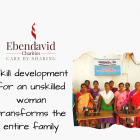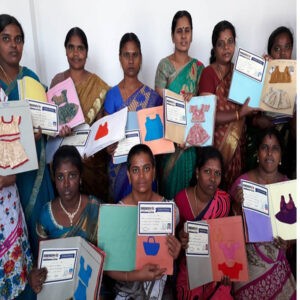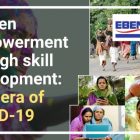Tag Archives: Skill Development
Skill development for an unskilled woman transforms the entire family
Skill development for an unskilled woman transforms the entire family
Women’s role in Life and Society
A woman’s role in life is to be the architect of society, and their role in society today is to be a part of the powerhouse for economic growth and development. While this is the motto, the reality, however, is that women, 50% of the world’s population, are simply under-utilized and undervalued in their potential to bring change.
In India’s young and booming population, 45% of women aged 15-29 are not part of any education, employment, or training, compared to just 6.5% of men. And when it comes to certain sectors of the economy, women are largely under-represented. Today, the role of women in life excludes them from being a part of infrastructure, healthcare, automotive, and information technology jobs, with this trend extending to the top leadership positions in businesses where a meager 4.7% of women held the roles of CEO in India in 2021.
What is the solution to the gender gap problem? Re-skilling and upskilling.
Skill Development Programs
The meaning of re-skilling is the process of learning new skills to do an entirely different job from the current one, while upskilling is learning new skills to add to pre-existing ones. Skill development, from those that are technical, such as learning computer programming, to entrepreneurial skills, such as setting up a sole trading business, is vital in the journey to empower women, with mentors of these programs being equally important, along with the network of individuals participating in it.
One such example of a skill development program on a national level is Skill India, which is also known as the National Skills Development Mission of India. It is a campaign created by Prime Minister Modi in 2015 to transform the lives of 40 crore individuals in various industry-related careers to create a strong, empowered workforce through skill development training courses and schemes. One of the ways that this skill development program stood out from others, was that they wanted to reduce poverty in the nation, as well as instill competencies rather than qualifications.
Impact of Women’s Skill Development
Women’s skill development is a method of improving a woman’s household’s capacity, autonomy, and employability, and provides the independence that they need to have free mobility. As stated by Devalt, ‘skill is the bridge between job and workforce’ and for women to participate in it, there must be a greater range of courses provided to specifically target them, especially courses that enable them to break into typically male-dominated fields, which require analytical, logical reasoning and inference skills, where pay is higher and jobs are more secure.
UNESCO believes that skill development is essential for women’s empowerment, by using education as a tool to serve this. According to their research, there are still millions of girls who should be in school but aren’t, and adolescent girls are found to be the most vulnerable to conflict, poverty, and discrimination. They also support life-long learning, a type of self-initiated education focussing on personal development. Examples of this are internships and apprenticeships, both of which help teach real-life skills to apply in the workplace. Internships are short-term stints that involve the individual applying their skills to complete a task, while apprenticeships last much longer and involve more classroom-based learning where individuals have the opportunity to shadow a senior member and learn alongside them, working towards a professional qualification that can help land a full-time job.
Reasons for Lifelong Learning
Furthermore, this lifelong type of learning aids in individuals feeling fulfilled and connected on a personal level, increasing their chances of meeting skill requirements in job descriptions and succeeding at a job on a professional level.
Since life-long learning is incredibly beneficial, why isn’t it all the more common? The reason is that its informal learning environment means that families that have a poor culture of learning, challenges such as dyslexia (which increases the difficulty of reading and speaking coherently), or simply low self-esteem, make it unlikely for women to sustainably continue educating themselves.
This is why skill development also serves a secondary role – the role of offering the sustainable development of skills, through an encouraging environment that boosts individual confidence. By keeping a smart company that is knowledgeable in a field, as well as starting a personal venture or project of their own, women are more likely to remain interested in a topic and continue pursuing it within and beyond it for the rest of their lives this way.
Lack of Resources for Rural Women
However, there is still a major barrier to entry – one that sets the hurdle higher for some women than others – which happens to be the place they were born.
Rural women in India are disproportionately disadvantaged by their lack of resources, and confinement to gender norms, which keeps them continuing to work in low-paying jobs. They lack literacy and field knowledge, preventing them from seeking better opportunities and job progression in the city.
SEWA, which is the Self-Employed Women’s Association, is the largest organization of informal workers in the world, which promotes the rights of low-income, independently-employed female workers. Its members don’t want charity – they want immediate work, and this voice was no louder than during the pandemic when hundreds of its members lost their livelihoods and often had to cut down on spending, such as by removing their children from school. Women play vital roles in the agricultural industry and form the backbone of rural economies. Because of a lack of job security, they often don’t have any other source of income to sustain themselves.
This is why we, Ebendavid Charities, encourage you to donate to fund our UpSkill Center, a center specifically designed to teach skills and courses for ladies, that has a tremendous impact on local areas in Tamil Nadu, transforming the lives of nearly 48 families a year.
As a student, you may get involved in volunteering for us, by sharing any skills you know and would like to teach underprivileged women, such as tailoring, MS Office, tally software, and computer training.
Please consider donating Rs. 2,000 a month or Rs. 10,000 for a one-time payment to help us set up and manage our UpSkill Centers. We work tirelessly with our Village/Slum Partners to ensure that the women who benefited from it are from low-income backgrounds and our dedicated Field Officer regularly assesses the skills of both the teacher and the students. We and the women you are financially supporting will be greatly indebted to you. Thank you.
Women Empowerment through skill development: in an era of COVID-19

Women empowerment and economic involvement are essential for women’s rights to be strengthened and to take control of their lives and exercise influence in society. Unsustainable progress is impossible without women’s economic empowerment. As a result of achieving gender parity and empowering women, development initiatives expand.
COVID Era
Wage disparities and the responsibility of unpaid care have driven more women out of the labor force and into poverty. Even before the pandemic, women’s earning income in India was just one-fifth that of men. During COVID-19, more women lost their employment globally and in India.
According to recent research by the Centre for Sustainable Employment at Azim Premji University in India, just 7% of males lost their employment over the first lockdown in 2020, in contrast to 47% of women who lost their jobs and did not come back to work by the end of the year.
Women did significantly worse in the informal sector. During March and April 2021, rural Indian women made over 80% of the lost jobs in everyday occupations.
Nearly 70% of the health care workforce is female, putting them at increased risk of infection. Still, women are under-represented in leadership and decision-making processes in the health care industry.
Women’s jobs, companies, earnings, and overall living standards may be more vulnerable to the predicted widespread economic impact from the crisis due to persisting gender disparities across many dimensions.
Many women are living alone on low salaries in the world than males. This situation puts these women at greater risk of economic instability.
Government on Women Empowerment
The Indian government has implemented various policies and regulations within the constitutional framework to increase women in different professions. In India, the majority of women are unskilled. As the link between job and labor, skills are essential.
Women’s employability and income-earning possibilities can be improved via skill development, as can rural livelihoods and sustainable rural development. Indicators of income inequality and poverty provide a glimpse into the social effects of the economy.
Indicators of employment outcomes include employment rates, unemployment, youth dropout in education, and wages.

Skill Development
We at Ebendavid Charities have created a vocational training program to help women at a disadvantage and have little exposure to technical skills and knowledge. Currently, India has a capacity of about 3.1 million people per year for skill development.
A 15 million-person increase in yearly capacity is envisaged under the 11th Five-Year Plan (FYP11). As of 2022, the country aims to have 500 million skilled people on its payrolls. Increasing the capacity of skill development programs is therefore necessary. We have already successfully taught about 130 women skills like tailoring to earn their bread and butter.
Improving women’s access to skill development, gender mainstreaming of content and delivery of training, and usage of digital platforms like YouTube for women’s empowerment are just a few of the policies that should be simplified to enhance the productivity of the economy and the involvement of women.
It will serve as a road map for skill development and assist the government in accelerating the process. We have gathered a few critical starting points for making this movement even more accelerating:
- Increasing the number of seats for the training program: There should be an increase in the number of training and apprenticeship seats and the number of female trainers to improve access to skill development.
- Mechanisms for certifying trainers should be robust, and a new training institute for women trainers should be encouraged.
- The unique Delivery mechanism is need of the hour: The importance of gender mainstreaming in training cannot be overstated. Unique delivery methods, such as transportable training units, flexible afternoon batches, and training tailored to local requirements are needed to overcome the gap.
- Should also consider problems relating to women’s rights such as a safe training environment, the hiring of women trainers, and an equitable compensation system and complaint resolution process.
- For skill development, ICT (Information and Communication Technology) should be used. Promote the use of the internet or mobile-based platforms that would link talented women with employers.
- A particular focus should be placed upon those women who are eager and ready to return to work after a hiatus, as well as those who are affected by migration. Following techniques can be used for retaining female employees:
- Introduction of role models in the relevant fields to the trainees is essential.
- Increase the number of opportunities for students to get their hands dirty.
- Encourage trainees to share their experiences by collecting and displaying testimonials.
- Quickly locate candidates in under-served areas.
- Initiate and implement a comprehensive equity strategy to identify and resolve discriminatory behaviors and artificial barriers to girls’ enrolment.
Airbnb, for example, is working with the government to boost homestay services by offering training in the hospitality and tourist industries. AMRITA VISHWA VIDYAPEETH is working with PMKVY to empower women in rural areas via skill development and job creation. While the initiative has a strong focus on disadvantaged people, it also includes indigenous populations.
The initiative has been conducted in Chhattisgarh, Odisha, Jharkhand, Kerala, and Tamil Nadu, with over 50% involvement from women. In Odisha, a partnership with the Humara Bachpan Trust seeks to provide job and business possibilities to about 1500 women from economically disadvantaged backgrounds.
As part of a partnership with Industry Crafts Foundation, a collection of producer group enterprises, women in Karnataka are being trained and supported. Homestays in the North East (Nagaland and Arunachal Pradesh) are getting better because of a partnership with Youthnet Home Stay Project.
Women Employment
According to the National Skill Qualification Framework (NSQF), over 450 employment opportunities are devoted to the training of women’s skills. Female involvement in new-age employment positions linked with Industry 4.0 like artificial intelligence, 3D printing, data analytics, etc., is encouraged by Skill India.
The number of women participating in hard skills such as welding and automotive mechanics has also grown. For example, CNC mechanics, artificial intelligence, and cyber security, which represent the future of work, have become popular among young ladies who have been exposed to our programs.
During the last two years alone, 892 women were trained as automation specialists, while around 500 were educated as CNC Operators, according to the report.
With the help of global industry giants like SAP, Adobe, and IBM, Skill India has created skill development programs matched with Industry 4.0 requirements.
We must test and mainstream COVID-resistant skilling models as soon as possible. Identifying talent shortages in important industries requires a comprehensive knowledge of the demand and supply imbalance.
Skill-based training is a critical component of employee development in India, and Ebendavid Charities is preparing to extend its skill-based training programs to make women develop their skills in tailoring and earn their meals.
Sources:
- Economic empowerment and skills development for young women | UN Women – Headquarters. (n.d.). Retrieved September 15, 2021, from https://www.unwomen.org/en/what-we-do/youth/economic-empowerment-and-skills-development-for-young-women
- Empowering Women through Skills and Workforce Development | Center for Strategic and International Studies. (n.d.). Retrieved September 15, 2021, from https://www.csis.org/analysis/empowering-women-through-skills-and-workforce-development
- Shetty, S., & Hans, V. B. (2019). Education for Skill Development and Women Empowerment. https://papers.ssrn.com/abstract=3348246
- Women Empowerment through Skill Development. (n.d.). Retrieved September 15, 2021, from https://www.devalt.org/newsletter/may19/of_1.htm
- Womens Empowerment – Facts, Stories and How To Help | World Vision Australia. (n.d.). Retrieved September 15, 2021, from https://www.worldvision.com.au/womens-empowerment/














